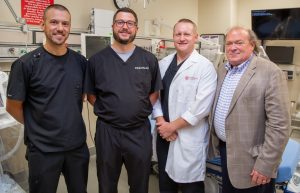How CHRISTUS St. Michael Health System Established an AAEP-Recognized EM Fellowship

As is the case with many areas across the country, it had long been difficult for Texarkana, Texas, to recruit residency-trained emergency medicine physicians. Over the years, many locum tenens EM physicians at CHRISTUS ST. Michael Health System would decide not to put down roots in the area. Although talented graduates of the local family medicine residency expressed interest in working in CHRISTUS St. Michael’s emergency department, its size and the acuity of its trauma patients required doctors whose training was not strictly family medicine.
CHRISTUS made exceptions for physicians with EM fellowship training or for family medicine physicians with significant experience in a major trauma center, but it was not enough. With Michael Finley, MD, spearheading the effort, CHRISTUS established its own EM fellowship, a program that essentially allowed it to “homegrow” EM physicians. The first graduate was Irwin Bo Price, DO, and the first two graduates were family medicine residency trained. Since then applications have increased significantly, thanks to recognition from the American Academy of Emergency Physicians (AAEP).
Andrew Jeb Frost, DO, an EM physician at CHRISTUS, modeled the system’s fellowship on the one from which he graduated at the University of Tennessee at Jackson. “My experience at UT was excellent,” he said. “The director and faculty were very knowledgeable and accommodating, and the curriculum was thorough.”
During his fellowship at Jackson Madison County General Hospital, there were always two to four attending physicians working simultaneously, but they weren’t required to see all patients. This arrangement placed the onus for delivering high-quality care on the fellows. But, for its own fellowship program, CHRISTUS wanted more oversight, Dr. Frost said. “At CHRISTUS, we require the attending physician to perform a face-to-face history and physical with every patient. This way we ensure that every encounter our fellows have provides opportunity for direct feedback from the attending physicians.”
Dr. Frost has high praise for Program Coordinator Jeff White, who “continues to find ways to improve our program as well as identify” standards the program needs to meet for AAEP recognition. “Our goal from the beginning was to become an AAEP-approved program, “Dr. Frost said. “Since our recognition we have seen our applications skyrocket.”
Created by the American Association of Physician Specialists, Inc. ® (AAPS) to help meet the urgent demand for board-certified EM physicians, the AAEP gives graduate fellows an eligibility pathway to certification by the Board of Certification in Emergency Medicine (BCEM). The BCEM is the only EM certification board in the nation that offers primary care trained physicians an eligibility pathway.
For more information about AAEP-recognized programs like the one at CHRISTUS St. Michael Health System, contact the American Board of Physician Specialties® (ABPS). The BCEM is a Member Board of the ABPS.










